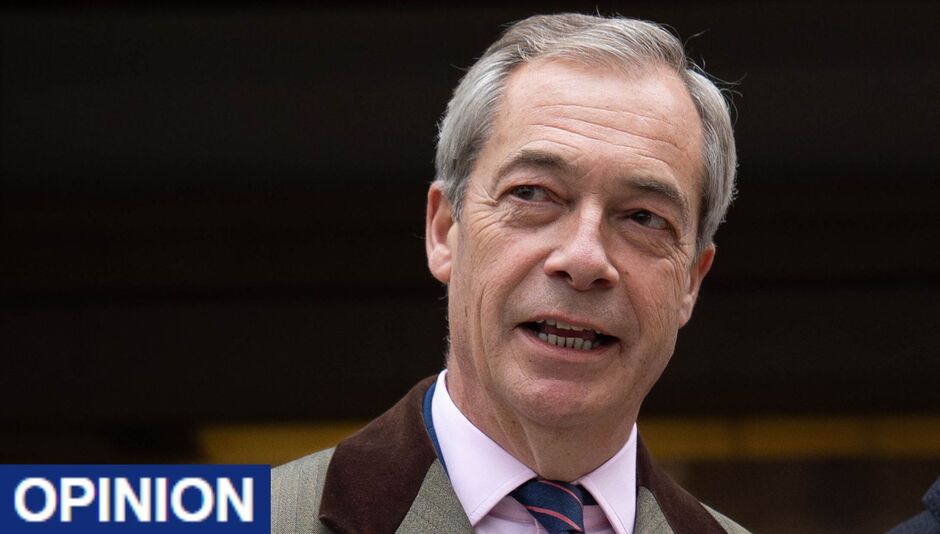Nigel Farage And The Rise Of Reform UK: A Political Analysis

Table of Contents
Farage's Political Trajectory and the Formation of Reform UK
From UKIP to Brexit Party to Reform UK: Tracing Farage's Evolving Political Strategy
Nigel Farage's career has been a rollercoaster of political shifts and party formations. His journey, marked by both successes and failures, provides crucial context to understanding Reform UK's emergence.
- UKIP (2006-2019): Farage led the UK Independence Party to significant gains, capitalizing on anti-EU sentiment. However, internal divisions and leadership struggles ultimately led to his departure.
- Brexit Party (2019): Following the UK's indecisive approach to Brexit, Farage founded the Brexit Party, achieving considerable success in the 2019 European Parliament elections. This demonstrated the enduring power of his anti-establishment message.
- Reform UK (2021-Present): After the completion of Brexit, Farage shifted his focus to domestic policy, establishing Reform UK. This party aims to address concerns about the cost of living crisis, immigration policies, and the perceived failures of the current political establishment. The perceived shortcomings of the Conservative government in the post-Brexit era played a significant role in this transition. A key policy disagreement – the perceived inadequate delivery of Brexit promises – fuelled this move.
The Appeal of Reform UK's Core Ideology: Analyzing the Party's Platform
Reform UK's platform centers on populist, right-wing policies aimed at resonating with a specific voter demographic disillusioned with mainstream parties.
- Brexit: Maintaining a hardline stance on Brexit and opposing further EU integration remains central.
- Immigration: Reform UK advocates for stricter immigration controls and border security.
- Economic Policy: The party emphasizes lower taxes, reduced government spending, and deregulation.
This platform appeals to voters who feel left behind by globalization and frustrated with the perceived failures of traditional political parties. The party directly challenges the Conservative Party for the support of right-wing voters, attempting to present a more uncompromising and ideologically consistent alternative.
Electoral Performance and Public Opinion
Reform UK's Electoral Successes and Failures: Examining Local, Regional, and National Election Results
While Reform UK hasn't achieved widespread national electoral success, it has made inroads in specific areas and demonstrated surprising local gains. Analyzing by-election results and local council elections paints a more nuanced picture of its performance. Data analysis reveals pockets of strong support, often in areas with a history of Euroscepticism. However, national election results have so far fallen short of initial expectations.
Public Perception and Media Coverage: Assessing Media Portrayal and Public Opinion Polls
Media coverage of Farage and Reform UK is often highly polarized, with both ardent support and fierce criticism dominating the narrative. Public opinion polls show fluctuating levels of support, highlighting the volatility of public sentiment towards the party. The party’s utilization of social media for direct engagement with voters has proven remarkably successful in bypassing traditional media filters and directly influencing public opinion.
The Impact of Reform UK on the UK Political Landscape
Disruption of the Traditional Two-Party System: Examining the Shifting Political Alliances and Potential Long-Term Effects
Reform UK's presence is undeniably disrupting the traditional two-party system. By pulling votes from the Conservative Party, it influences the political landscape and forces a reassessment of traditional voting patterns. The potential for future electoral realignment and the emergence of new political coalitions is significant. The party's direct influence on policy debates regarding Brexit and immigration is undeniable.
Key Challenges and Future Prospects for Reform UK: Analyzing Limitations and Potential for Growth
Despite its impact, Reform UK faces numerous challenges. Internal cohesion, securing consistent funding, and overcoming the perception of being a single-issue party are all crucial hurdles. However, its future prospects hinge on its ability to broaden its appeal beyond its core voter base and translate its media presence into sustained electoral success.
Conclusion: Nigel Farage and the Rise of Reform UK: A Political Analysis
The rise of Reform UK, under the leadership of Nigel Farage, represents a significant shift in British politics. While not yet a dominant force, the party's influence on public discourse and electoral dynamics is undeniable. Its success lies in capitalizing on voter dissatisfaction with mainstream parties and effectively harnessing the power of social media. Understanding "Nigel Farage and the Rise of Reform UK" requires a continued analysis of its electoral performance, public perception, and evolving political strategy. To stay informed, follow the party’s activities and actively engage in political discussions surrounding its impact on the UK political landscape.

Featured Posts
-
 La 45 Vuelta A Murcia Un Exito Para Fabio Christen
May 03, 2025
La 45 Vuelta A Murcia Un Exito Para Fabio Christen
May 03, 2025 -
 Freedom Flotilla Ship Attacked By Drone Off Maltese Coast
May 03, 2025
Freedom Flotilla Ship Attacked By Drone Off Maltese Coast
May 03, 2025 -
 Fortnites Captain America Giveaway Dont Miss Out
May 03, 2025
Fortnites Captain America Giveaway Dont Miss Out
May 03, 2025 -
 Woke Criticism Validates Doctor Who Says Star
May 03, 2025
Woke Criticism Validates Doctor Who Says Star
May 03, 2025 -
 The Astonishing Change Of Harry Potters Crabbe Actor
May 03, 2025
The Astonishing Change Of Harry Potters Crabbe Actor
May 03, 2025
